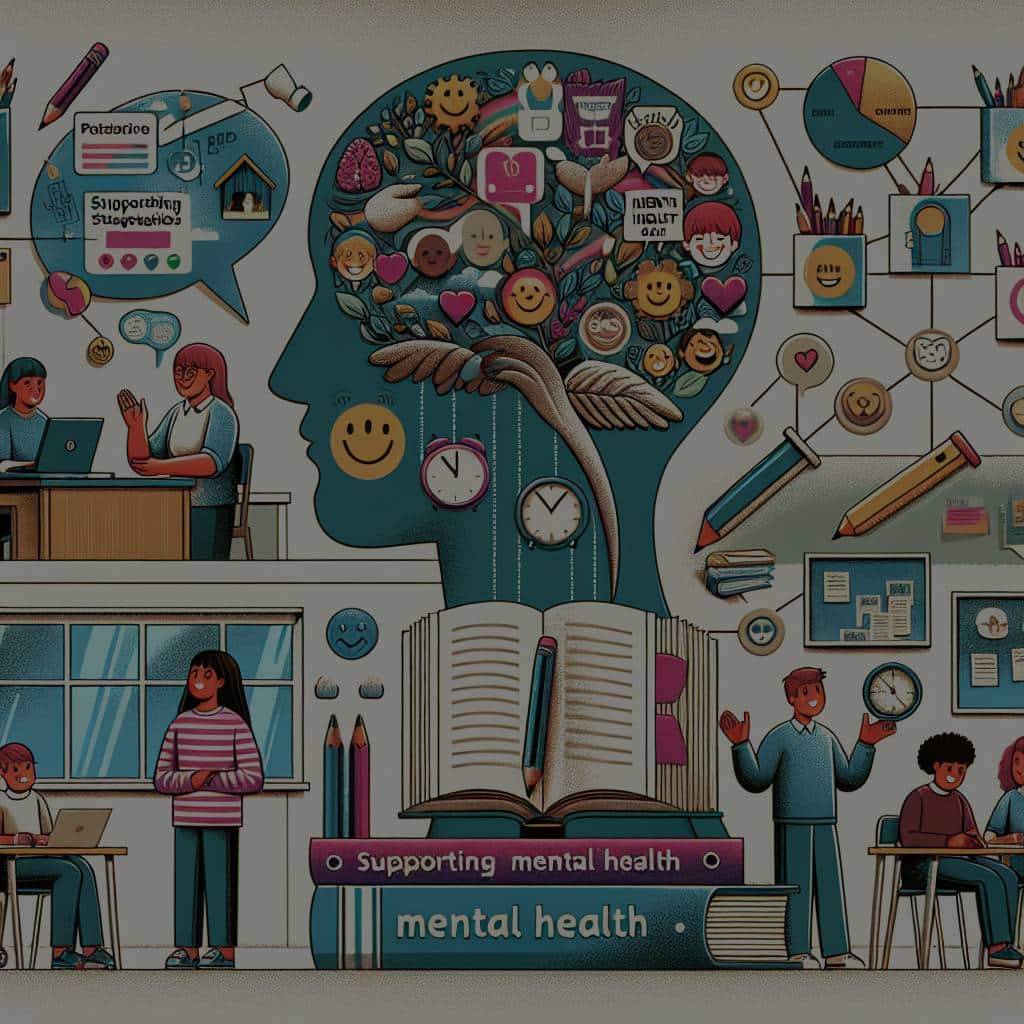The topic of mental health has been a burning issue across various sectors and industries. However, it is particularly critical in the education space where young people, who are still in their formative years, are faced with numerous challenges that can potentially affect their mental well-being. As esteemed educators and stakeholders in the education sector, it is imperative that you understand the vital role schools play in supporting the mental health of students. This article will delve into various best practices that have been reported to be effective in supporting mental health in the UK’s education system.
Prioritising Mental Health: The Role of Schools and Colleges
The role of schools and colleges in supporting the well-being of their students extends beyond academic provision. In fact, education institutions, whether primary schools, secondary schools, or colleges, serve as important hubs for promoting mental health among young people. Research data suggests that students who feel supported by their school are less likely to experience mental health problems.
Also to read : What are the critical factors for UK startups to secure venture capital funding?
In a report from Google Scholar, schools that prioritised mental health support witnessed significantly lower rates of mental illness among their students. This underlines the crucial role that education institutions play in safeguarding the mental health of their pupils.
Schools and colleges can make mental health a priority by integrating it into their policies, teaching methods, and community outreach initiatives. Staff training should also include mental health awareness to ensure that teachers and other staff members are equipped to identify and address mental health issues among students.
Also read : How to create a successful grassroots environmental movement in your UK community?
Implementing Comprehensive Mental Health Support Programs
Schools have a unique opportunity to provide support to students facing mental health challenges. It’s important to design mental health programs that cover preventative measures, early detection, intervention and post-intervention care. Such programs should be tailored to meet the specific needs of students at different stages of their education journey.
Well-implemented support programs have been reported to reduce school absenteeism, improve academic performance, and enhance overall student well-being. These programs can include counselling services, peer support groups, and mental health education as part of the curriculum.
Such programs can also utilise digital tools such as Google Classroom, which allows teachers to keep track of students’ progress and provide timely intervention when necessary. In addition, schools can collaborate with mental health professionals to provide expert counselling and therapy services to students who need them.
Encouraging Open Dialogue and Breaking the Stigma
One of the major obstacles to mental health support in schools is the stigma associated with mental health problems. This can lead to students feeling isolated and reluctant to seek help. Therefore, it is essential for schools to foster an environment where mental health is openly discussed and understood.
To break the stigma, schools can organise mental health awareness campaigns, host speakers who are mental health advocates, and incorporate mental health education into the curriculum. Schools can also encourage students to share their experiences through safe and supportive platforms such as school assemblies, newsletters, or even via email.
Encouraging open dialogue about mental health not only helps to break the stigma but also enables students to understand their own mental health better. This understanding can be a crucial step in helping them seek help when they need it.
Collaborating with Parents and the Wider Community
Supporting the mental health of students is not a task that schools should undertake in isolation. Parents, caregivers and the wider community play a crucial role in ensuring that students have a supportive environment both at school and at home.
Schools can facilitate this collaboration by keeping parents informed about their child’s mental health and academic progress. Regular communication with parents via email or parent-teacher meetings can help in identifying any potential mental health issues early. Schools can also involve parents in mental health awareness campaigns and workshops to ensure that they are adequately equipped to support their children’s mental health.
Moreover, schools can collaborate with community organisations that offer mental health support services. This way, if a student needs help beyond what the school can provide, they can be referred to these organisations for further assistance.
Investing in Research and Regular Data Analysis
In order to implement effective mental health support strategies, schools need to understand the specific mental health needs and challenges of their students. Investing in research and regular data analysis can help schools achieve this.
By conducting surveys or using data collection tools, schools can gather important information about students’ mental health. This data can then be analysed to identify trends, areas of concern, and the effectiveness of existing support strategies.
Furthermore, schools can utilise platforms such as Google Forms for easy data collection and analysis. This information can be invaluable in shaping mental health support strategies and making necessary adjustments to existing programs.
In conclusion, supporting mental health in the education system requires a multifaceted approach that includes prioritising mental health, implementing comprehensive support programs, encouraging open dialogue, collaborating with parents and the wider community, and investing in research and regular data analysis. With these best practices, schools can significantly enhance their ability to support the mental health of their students effectively.
Enhancing Mental Health Provision in Schools through Technology
The rapid advancement of technology has provided new opportunities to enhance mental health support in schools. Digital platforms can be used not only to facilitate direct support services but also to promote mental health awareness and education among students.
For instance, social media platforms like Twitter and Facebook can be used to disseminate mental health information and resources. Schools can leverage these platforms to reach out to students, parents and the wider community, promoting understanding and reducing the stigma surrounding mental health. Moreover, these platforms can also serve as a medium for students to share their experiences and stories, fostering a supportive online community.
Furthermore, digital tools such as Google Classroom and Google Forms can contribute significantly to data collection and analysis. Regular online surveys can facilitate the collection of valuable data about students’ mental well-being. This data can then be analysed to identify trends, assess the effectiveness of existing support strategies, and tailor future interventions.
The use of technology, however, should be carefully managed to avoid exacerbating mental health issues. For instance, schools should have policies in place to prevent cyberbullying and to regulate the use of digital devices during school hours.
By incorporating technology in mental health provision, schools can reach out to a wider audience, provide prompt support and enhance overall mental health outcomes among students.
Building a School-Based Mental Health Support Framework
Mental health support in schools should not be treated as a separate entity but rather, it should be integrated into the school’s overall education framework. A school-based mental health support approach involves creating a conducive learning environment that prioritises mental health and promotes the holistic well-being of students.
To achieve this, schools need to adopt a proactive approach towards mental health. This involves regular staff training on mental health awareness and provision of adequate resources to support mental health in schools. Teachers should also be equipped with the necessary skills to identify signs of mental health issues among students and to provide immediate assistance.
Schools can also partner with mental health professionals and community organisations to supplement the in-school support services. This broad-based approach ensures that students receive comprehensive mental health support that is responsive to their unique needs and circumstances.
Moreover, it’s crucial to involve parents and caregivers in the mental health support framework. Regular communication via LinkedIn, email and parent-teacher meetings can keep them informed about their child’s mental health and academic progress, facilitating early detection and intervention of mental health issues.
Providing a comprehensive school-based mental health support framework helps to create a supportive and nurturing environment, which is vital for the overall development and well-being of children and young people.
Conclusion
In conclusion, supporting mental health in UK’s education system requires a strategic and comprehensive approach that puts the students’ mental well-being at the centre. Schools and colleges play a pivotal role in this regard, and they should prioritise mental health in their policies and practices.
Importantly, this endeavour involves various stakeholders, including teachers, students, parents, and the wider community. Schools need to foster open dialogues about mental health, break the stigma surrounding it, and collaborate closely with parents and the community to provide holistic support to students.
Moreover, the use of technology and data analysis can significantly enhance mental health provision in schools, enabling them to respond promptly and effectively to the mental health needs of their students.
By adopting these best practices, UK’s education system can create an environment where mental health is valued equally as academic achievement, fostering healthier, happier, and more resilient young people.











